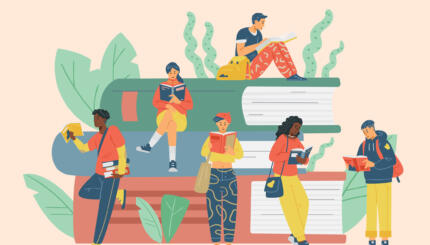Galeet Dardashti comes from a long line of renowned Persian singers. Her grandfather, Yona Dardashti, was a famous performer of Persian classical music in Iran. Her father, Farid Dardashti, sang on a weekly television show in Iran and later became a hazzan in the United States.
Dardashti herself has been performing since she was a child, and among other projects she currently fronts an all-female Mizrahi band called Divahn that has appeared at festivals around the world. She is also a scholar and a master teacher of Middle Eastern Jewish music. In a recent conversation with Team Be’chol Lashon she spoke of her desire to reach out to new audiences with Divahn’s new album, Shalhevet (Hebrew for “flame”). Below are excerpts from the conversation.
Tell us about how you came by your interest in Persian music.
I did not grow up with Persian music. I grew up in the United States in an egalitarian Ashkenazi Jewish world because my father, a hazzan, had studied at the Jewish Theological Seminary. I wasn’t steeped in Middle Eastern music. I had to learn it for myself. I began my Ph.D. in anthropology to learn more about my grandfather’s music and his story. In the late nineties, I received a generous graduate fellowship to study Persian and planned to do research in Iran, as it seemed like the country might open up. When that did not happen, I shifted my research to Israel and what happened to my grandfather when he immigrated with my grandmother from Iran in the 1960s. At that time there was a lot of discrimination against Jews from Middle Eastern backgrounds and as an anthropologist, I started researching how the contemporary moment in Israel had shifted. Grad school was also the time I met the original musicians with whom I formed my band, Divahn.
What inspired you to record Shalhevet, and what has the response been so far?
My band, Divahn, had mostly been focused on doing a lot of live performances in the last couple of years, but then the Trump election of 2016 happened. Like so many, we were all so devastated and really wanted to respond as artists, so it became really clear that we were going to make another album. We felt that we had something to say and that the world needed an all-female Middle Eastern Jewish album that celebrated what connects us, rather than what tears us apart. We titled the album “Shalhevet” (flame) because we hoped that we could offer light amidst the sometimes darker world we find ourselves in. We had no idea we would be releasing the album amidst a global pandemic but I hope that our music offers some light to folks during this time.
Our album release was on March 7th at Joe’s Pub in New York City–right before the pandemic really hit. The response at that show was incredible but the rest of our tour has been suspended for now. So we will delay our world takeover until the pandemic ends. But in general, we’ve gotten some really wonderful feedback on the new album from fans and press, which is exciting.
Not only are we an all-female band but I sing sacred music that is usually sung by men. Many women–many of them Middle Eastern Jewish women–have told me how empowering it is for them to hear a woman sing this music. That is always very exciting and inspiring to hear.
Divahn group shot. Galeet Dardashti at the center.
You are one of the pioneers in the United States of composing and performing Middle Eastern Jewish music. Have you seen any changes in recent years?
This is a super exciting time. When I started Divahn 18 years ago, there were no American Jews of Middle Eastern background performing Jewish Middle Eastern music. There were a few Israelis here and there in NY briefly but I had no compatriots.
When people started inviting me to perform Middle Eastern Jewish music the audiences and the people inviting me were predominantly Ashkenazim. They were the ones interested, and not people from Middle Eastern backgrounds. Now we have young Jews of Middle Eastern backgrounds who are progressive and leftist and want to connect with their traditions and they don’t want to hide any part of their identity. They have had to go to Ashkenazi synagogues because there were no egalitarian spaces for Middle Eastern Jews. These young people want to be recognized as Jews with different cultural traditions because not all of us are Ashkenazim.
What is your philosophy when it comes to teaching students and passing along these musical traditions?
I feel a responsibility to do more teaching especially because many of these young Middle Eastern Jews have been reaching out to me.
This past fall, I was invited to Boston and gave a lecture for the Kavod community in conjunction with Mayyim Hayyim. They have a number of Jews of Color and Mizrahi members and I did an additional workshop for just these students who want to explore their Middle Eastern musical background. It was powerful for them and for me. What was powerful for me was that while these young people in their twenties feel disconnected from their roots, they also desperately want to connect with it. Singing some of this music and sharing their own songs, even if they don’t remember them well, is moving and helps build connections and pride.
For me as a scholar, I’ve seen that this is what Israelis started doing 20 years ago. What happened in Israel is very different from the American context, but the desire to connect with this ancestry is similar. I see lots of parallels and have begun research on these parallels and similarities.
Given that most of those producing and leading Jewish music are not of Middle Eastern descent, how do you navigate the challenges of appropriation?
If you go to Sephardi or Mizrachi or Persian synagogues, you can hear that they are borrowing tunes from other communities. My grandfather loved Umm Kulthum [famous Egyptian singer and actress] and according to my father, he was influenced by her music. There are, to borrow a phrase from my friend and colleague, Dr. Amy Horowitz, appropriate appropriations. The key is treating these traditions and those who teach them to you with respect.
I was recently invited to teach at Let My People Sing and also at Hadar’s Rising Song Institute. Many of these young people are very interested in the music I have to share. They are mainly Ashkenazi, but they want to learn. As long as they are respectful of where it comes from and the context, that is more than okay by me. I welcome and encourage it.
We are global communities now. It is important that our prayer leaders allow those people of Sephardic and Mizrahi background to be seen and heard. They can share our music respectfully by crediting who taught them those pieces and what Jewish community the music/text comes from.




